Notes on genocide prevention and other kinds of organizing, mutual aid, and activism on social networks
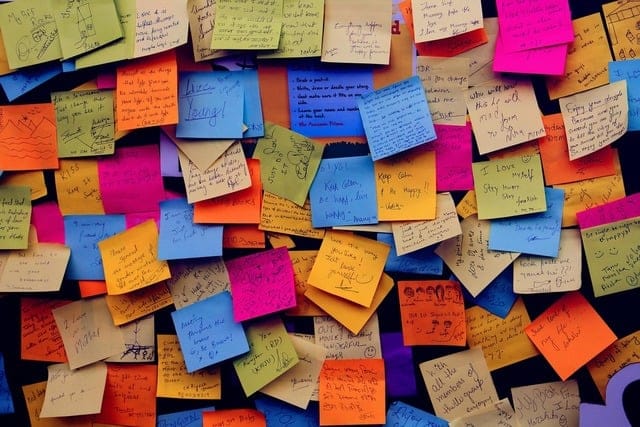
Part 4 of If not now, when? Do you have thoughts on the general topic or specific feedback on this post? Please join the discussions on Mastodon, Bluesky, or Lemmy – or use the CryptPad form here if you prefer (don't be surprised if it takes a few seconds to come up).
"Mutual aid. Organizing. Sharing, contextualizing, and making meaning of news and health information to counter propaganda and information overload. The use cases for alternative social networks – not controlled by techbro white supremacist CEO's working with their cronies in authoritarian governments – practically write themselves in today's world. And with so many talented social scientists, designers, systems thinkers, and developers directly impacted by DOGE, MAGA, et al, there are a lot of people with the right skills for these new networks to make rapid progress."
– If not now, when? Mutual aid and organizing in the fediverses, the ATmosphere, and whatever comes next, March 2
"You probably won't be surprised to hear that we didn't solve all of these issues during our one-hour discussion. We did however decide on some concrete next steps: collecting and prioritizing organizing, mutual aid, and activism needs – and then working with projects and organizations who are (hopefully) incentivized to make progress on these issues"
– More notes on Organizing, Mutual Aid, and Activism on decentralized social networks, April 3
It's been a busy month, and everybody involved in the discussions is stretched in a million ways. Fortunately, enough people have found enough scraps of time here and there that we've made a lot of progress. By the time of our May 1 meeting, we not only had a list of several projects and organizations interested in working with us, we had also collected needs for many of the important high-level use cases on our current list.
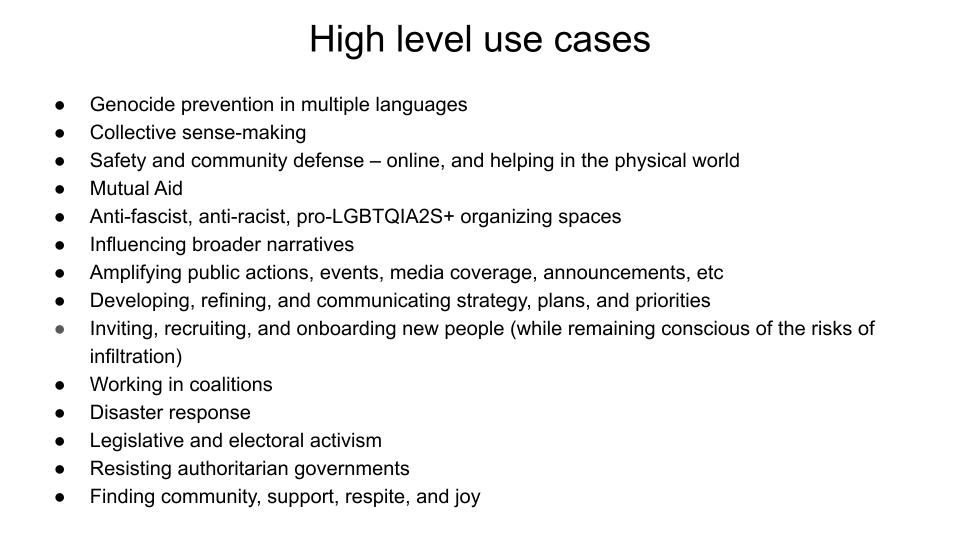
You probably won't be surprised to hear that we didn't discuss all of these in detail during the hour-long meeting. In fact we spent most of the meeting digging into the first one. And for good reason! As DAIR's recent paper on The Role of Expertise in Effectively Moderating Harmful Social Media Content notes,
"A number of researchers, journalists and victims of genocide have documented the extent to which social media platforms have spread genocidal content [18, 79, 93], leading to lawsuits against companies like Meta by victims of genocide and civil society leaders [5, 48]. This failure to adequately moderate genocidal content, especially in languages and regions major social media platforms do not invest in, has been discussed in a number of contexts [18, 75, 78]. For example, the 2020-2022 war in the Northern Ethiopian region of Tigray has been described as the worst genocide of the 21st century thus far [63], with hateful content rampant on social media platforms during the war [33, 52, 70]."
Prithvi Iyer's What a New Study Reveals About Content Moderation in Tigray, on Tech Policy Press, is a good summary of DAIR's recent work, and Erin Kissane's series Meta in Myanmar is a detailed look at the role social media played in the genocide of the Rohingya people in Myanmar. And as DAIR's statement that Social Media Platforms Are Spreading Violent Warmongering Content Encouraging All-Out War Between Ethiopia and Eritrea, Again warns, Big Tech companies like Meta and TikTok still haven't addressed the underlying problems.
Still, that was only one of the topics we covered. Here's a writeup of the notes from the meeting, along with some related thoughts.
- Organizing in a pluriverse
- Anti-genocide activists' needs provide great insights on opportunities to do a lot better than Big Tech social networks
- Anti-genocide activsists aren't the only ones with these needs
- Challenges to address
- Look at us, we're doing organizing on decentralized social networks!
- Appendix: Friendly(ish) spaces, contested terrain, hostile ground
- Previous posts in the series
- Notes, with additional links and references and the occasional hopefully-amusing comment
Organizing in a pluriverse
"Our research found a transition to a pluriverse of options could be the most viable way forward: this might include repurposing existing platforms, embracing low-tech approaches, and developing innovative alternatives that meet the needs of social justice organizations and marginalized communities."
– Engine Room's report on Exploring a transition to alternative social media platforms for social justice organizations in the Majority World
If you're not familiar with the term, "pluriverse" has its origins in decolonial theory.0 Pluriverse: A Post-Development Dictionary (2019) contains over one hundred essays on "transformative initiatives and alternatives to the currently dominant processes of globalized development, including its structural roots in modernity, capitalism, state domination, and masculinist values" ...
Hey that sounds like a pretty darn good description both of the values of Meta and Xitter and Big Tech in general – and the opportunities for transformative alternatives we're exploring!1
So before we focused on anti-genocide activists' perspectives, we talked a bit how decentralized social network ecosystems like the ATmosphere and the ActivityPub Fediverse fit into a broader pluriverse.
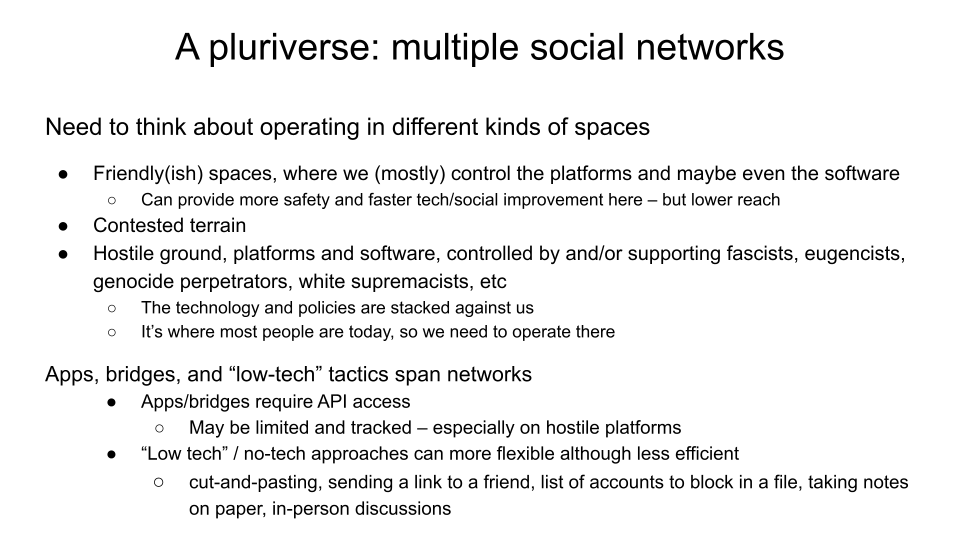
The appendix on Friendly(ish) spaces, contested terrain, hostile ground goes into more detail on these distinctions, the connectivity between different networks, and the implications from a threat modeling perspective.2
Anti-genocide activists' needs provide great insights on opportunities to do a lot better than Big Tech social networks
Even. though we had only talked to a handful of anti-genocide activists (one of our next steps is to get more input), their needs provide some great insights on opportunities to do a lot better than Big Tech social networks – although also highlighted some things they do well from activists perspective, as well as on challenges and limits of using newer social networks like Bluesky and Mastodon. For example:
- A safer online space
- Context-aware moderation including paying attention to languages other than English
- Robust mechanisms for deplatforming bad actors
- Better solutions than blocklists
- Holding important information for longer periods so it doesn’t get lost into the abyss – more than just pinning posts
- Avoiding getting censored by the platform providers
- Widely disseminating information on commercial social networks, despite the intense censorship – because that's where the people are, and the same functionality and user interfaces that keep people addicted is also very good for awareness
The last point relates directly to the pluriverse model. For some activists, it's easiest to reach their community on Facebook, TikTok, and/or Instagram. For some, Xitter (even today) plays a key role because that's where journalists, civil society organizations, and politicians are. None of this is going to change overnight.
Decentralized social networks certainly have the potential to be a lot better than commercial social networks on most of these issues. Then again, there's still a lot of work to be done. Consider the linked topics of context-aware moderation and robust deplatforming mechanisms (both critical for safer online spaces):
- Blacksky is a great example of leveraging the support for moderation services built into Bluesky and the ATmosphere (the ecosystem of software using Bluesky's AT Protocol) to provide context-aware moderation, and there are also language-specific moderation services. Blacksky also includes functionality like BanFromTV, aka deplatforming (from Blacksky, although not Bluesky as a hole).
- On Mastodon and in the broader ActivityPub Fediverse, Erin Kissane and Darius Kazemi's Governance on Fediverse Microblogging Servers note that "thoughtfully governed" medium-sized instances (communities) "are especially well positioned to offer a model of high-context, culturally sensitive online community that outperforms most interactions with centralized platform governance." Not only that, groups of cooperating instances (communities) sharing data using tools like The Bad Space can often put pressure on other communities to deplatform bad actors – and can use the blunt but powerful tool of mass defederation to deplatform entire communities.
But there's certainly a lot of work to be done as well ...
- Bluesky frequently refuses to deplatform bad actors (see Bluesky and The Battle of Wormtongue for an example), and ATmospheric communities like Blacksky are only just starting to explore ways of working together.
- Defederation in the ActivityPub fediverse has significant downsides today; there aren't any good options when large instances like mastodon.social refuse to deplatform a bad actor; and most large instances have refused to deplatform Meta's Threads – which is just as badly moderated as any other Meta platform.
Despite the (very real) limitations, it's certainly encouraging that there are at least two different "technology stacks" that are making progress. And there are certainly some straightforward opportunities for improvement.
Take keyword blocking, a specific request from one of the anti-genocide activists. Of course, keyword blocking is far from a perfect solution, and it potentially has downsides as well (including mistakenly blocking reclaimed slurs or keywords used in in-group contexts). Still, despite its limitations it can be very useful. And Facebook et al don't even block well-known slurs in most languages, so there's plenty of room for significant improvement. Meanwhile in friendlier spaces:
- Bluesky's moderation services are an easy way to do this kind of blocking, and the "Moderation Relay" that Blacksky's Rudy Fraser mentions here could lead to aggregation of multiple language-specific keyword blockers.
- In the ActivityPub Fediverse, instance catalogs like The Bad Space and FediSeer and recommendation systems like FIRES could easily3 be adapted to help admins and mods exchange and vet proposed keyword blocks; some platforms offer tools for admins and mods to block keywords at the instance level
Right now though, there aren't good keyword lists for most languages. The communities being targeted have the context, knowledge, and skills to develop high-quality lists of keywords to block – including using low-tech and no-tech approaches. Once those keyword lists exist, moderatiom services and moderation relays in the ATmosphere could apply them; so could instance catalogs and recommendation systems. Organizations like IFTAS (the federated trust and safet non-profit) could help share this information with volunteer moderators across ActivityPub Fediverse and the ATmosphere. Technology improvements can help here (platforms like Mastodon could provide tools for bulk upload of keyword filters for admins and individual users) but they're not barriers; if enough people are interested can start now, without waiting for any new functionality.
Okay, there's a lot of details to work out but once again ... it's encouraging!
Anti-genocide activsists aren't the only ones with these needs
Speaking of next steps at this point we realized that we had less than fifteen minutes left in the meeting and almost everybody had a hard stop at the top of the hour. So we quickly went through a few slides highlighting a few places where the needs the anti-genocide activists mentioned are similar to the issues that come up when exploring other use cases.
- Collective sense-making projects are all about holding important information for longer periods so it doesn’t get lost into the abyss. They want to get information out widely on commercial social networks too
- Ditto for mutual aid organizers – and many other organizers as well, since "meet people where they are" is a core principle of organizinge, and today they're on Facebook, Instagram, TikTok, Xitter, etc .
- Safety is a widely-shared need; as Engine Room notes
Alternative platforms, like mainstream options, also face challenges around safety, abusive content and inadequate content moderation. Further support is needed to ensure that self-managed platforms do not perpetuate the same inequities and harms experienced on mainstream options. Likewise, more attention should be given to developing community content moderation practices.
It's also worth highlighting that many of the needs the anti-genocide activists mentioned are similalry highlighted in other work. Article 19's Queer Resistance to Digital Oppression (based on input from over 5000 LGBTQI+ people in 8 countries across the Middle East and North Africa), for example, discusses the importance of safety, responding to hate speech in language other than English, and communications lines with platform vendors. A recent paper on Social Media for Activists: Reimagining Safety, Content Presentation, and Workflows, based on interviews with 14 activists from an environmental and a queer-feminist movement in Germany, notes that "The key finding is that on- and offline safety is their main need." Hey wait a second, I'm noticing a pattern here.
Social media is only part of the bigger picture
One thing that's become steadily clearer to me over the course of this project so far is how important it is to consider social media in the context of the overall context of what organizers are doing. Take the high-level use case of "developing, refining, and communicating strategy, plans, and priorities," one that's near and dear to my heart because it's one of the things we're doing on this project. As part of this, discussions on social media – in public, in private groups – can certainly be helpful in gathering input and feedback; and once we've come up with something, social media will certainly be useful for sharing the information.
But that's only a small part of what we're doing. We also need to write and review documents and presentations, schedule and hold meetings to discuss, take notes, make decisions, do threat modeling, track action items., etc etc etc. And on the social side we have to deal with questions like who’s at the table, who gets to speak (and who's listened to), how are decisions made, and what gets emphasized in talking points ... plus all the non-technical aspects of project management such as herding cats. It's a lot!
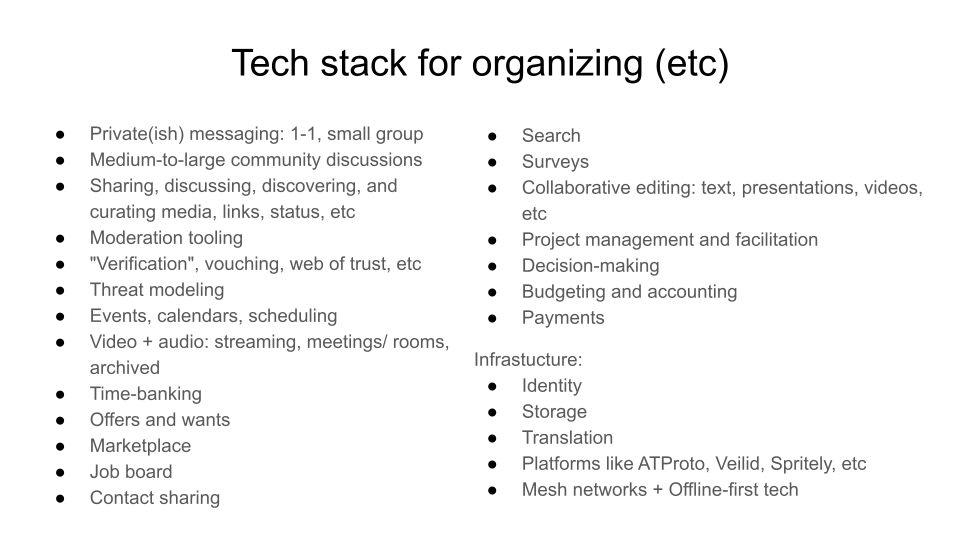
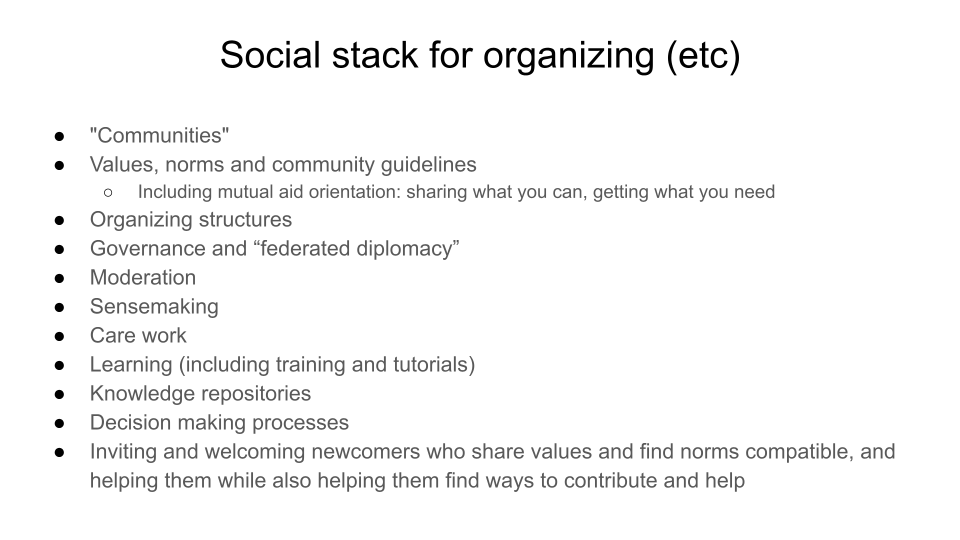
Each of these is a huge discussion in its own right. For example, here's a list of examples we had for "Organizing structures":
- Different channels for leadership, trusted members, broader group, network
- “Lobby” for newcomers (with greeters), followed by inviting people to group channel(s)
- Curated feed (for important announcements, actions, events, news stories, etc)
- “Welcome packet”, FAQ, onboarding meetings, and place for newcomers to get help
- Status page (possibly with limited visibility) so everybody can see what’s up
Note that these structures can be implemented on various technologies. Channels and a lobby can be implemented as separate Signal group chats, channels on a Matrix or Discord server, categories on a NodeBB site, or even multiple fediverse instances (if you're a masochist). A curated feed could be an AT Protocol custom feed, a social media account that boosts interesting posts, or a newsletter with interesting links for the day or week. A status page can be a pinned thread in a NodeBB forum (which is how we're doing it on this project), a Google / CryptPad / NextCloud document with access control, a password-protected web page, a pinned message in a Matrix channel, etc etc etc.
That said, the technology still matters: specific affordances and usability tradeoffs of different platforms can have an impact on how effectively different groups can leverage them. So there's almost certainly a lot of room for improvement here as well.
These are all challenges we'll have to address in our own organizing, so we can't ignore these issues. Then again, I'm not suggesting that we should expand our scope to cover the entire tech and social stack – we've already got more than enough on our plate already just focusing on the social media aspects! So hopefully as we move forward we'll learn techniques to do all these things more effectively – and find opportunities to collaborate with people and organizations working to move the state of the art forward in all these other areas as well.
Challenges to address
"In order for this to be successful, however – in other words, to imagine and build an ecosystem of community-centered alternatives where organizations can mobilize, organize and connect – we need to address a number of challenges, including tackling technological barriers, building resilience to the harms of mainstream social media, and strengthening capacity."
– Exploring a transition to alternative social media platforms for social justice organizations in the Majority World notes
It's also important to keep in mind how much work still needs to be done to make even the somewhat-safer, friendly(ish) areas of the pluriverse useful to organizers and activists – especially for people who aren't techies, don't have the connectivity and hardware that so many people in the US and Western Europe take for granted, and/or use assistive technology. And there are lots of other holes as well – like threat modeling, for example, which is almost never done today (and even when it is done often doesn't involve the people from decentered communities who are the targets of the threats).
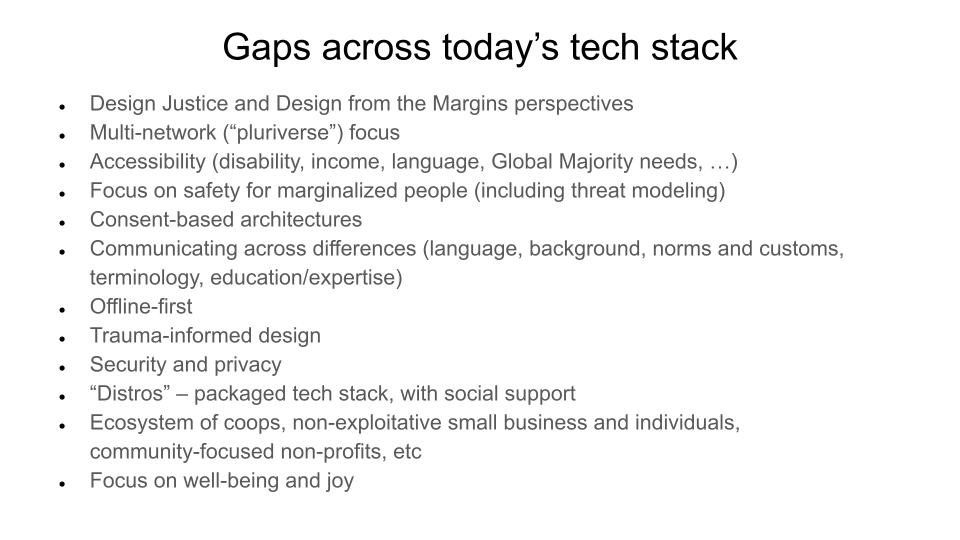
Still, there are clearly paths forward, described in Engine Room's research, De|Center's discussion draft of Design from the Margins: A Methodology to De-weaponize Tech, and the work the Design Justice Network has done and continues today. And the good news is that we're starting to get a much clearer picture of where we can make incremental progress – as well as the need for more transformative approaches longer-term.
Thinking of today's implementations as prototypes – useful in some situations, but also with major limitations – the needs we're surfacing here align well with all three complementary aspects of the path forward I talked about in If not now, when?
- Find ways to leverage and improve the current prototypes
- Build whatever comes next.
- Help people move from corporate social networks - without losing their support networks, ties to communities, and connections with friends and family.
Look at us, we're doing organizing on decentralized social networks!
In the last few minutes of the meeting we very quickly talked about ongoing communications.4 One of the complexities of grassroots organizing is that most people won't be able to make it to most meetings; everybody's ridiculously busy with other incredibly important stuff, and a project like this isn't anybody's top priority. So it has to be easy for people who have the time to keep up what's happening even if they're not at meetings, and for people who haven't been able to track the details to very quickly see what the top priorities and next steps are, and who's working on what, if and when they do have a bit of time available.
Easier said than done, of course, but here's how we're going to try to approach it:
- A NodeBB forum, with a Status Page (including a list of upcoming meetings and other events) and general discussions
- A Signal group for notifications of upcoming meetings, sharing high-priority links and important status updates.
- Different channels for different working groups, often probably hosted elsewhere; for example, it might make sense to have discussions for the project on keyword blocking in the existing IFTAS Connect community (since many fediverse moderators are alreaedy members)
- Regular meetings, increasing the tempo from one a month and thinking about how to adjust times to ensure that people who aren't in the US and Western Europe can participate. Fortunately I don't mind staying up late from time to time, and even though I am most definiitely not a morning person I can get up very early every now and then.
- Looking forward, potentially adding a Matrix chat to complement the forum, less-structured online time (welcome sessions for people just joining the group, "office hours" to talk about whatever topics people want, something along the lines of Clubhouse rooms or Twitter spaces to talk about the topic of the day), and maybe even an online workshop to explore some of these topics in more detail. But, let's not get ahead of ourselves!
And of course we wrapped up the meeting by summarizing action items and next steps, including setting up the status page for the group ... Why yes, now that you mention it, we're doing a lot of the tasks – and dealing with a lot of the challenges – that have shown up earlier in the discussions.
Look at us, we're doing organizing on decentralized social networks!5
To be continued ...
Previous posts in the series
- If not now, when? Mutual aid and organizing in the fediverses, the ATmosphere, and whatever comes next, including a reading list
- Notes (and thoughts) on organizing in the fediverses and the ATmosphere, focusing on perspectives of US-based progressive activists
- More notes on Organizing, Mutual Aid, and Activism on decentralized social networks, the previous meeting
Appendix: Friendly(ish) spaces, contested terrain, hostile ground
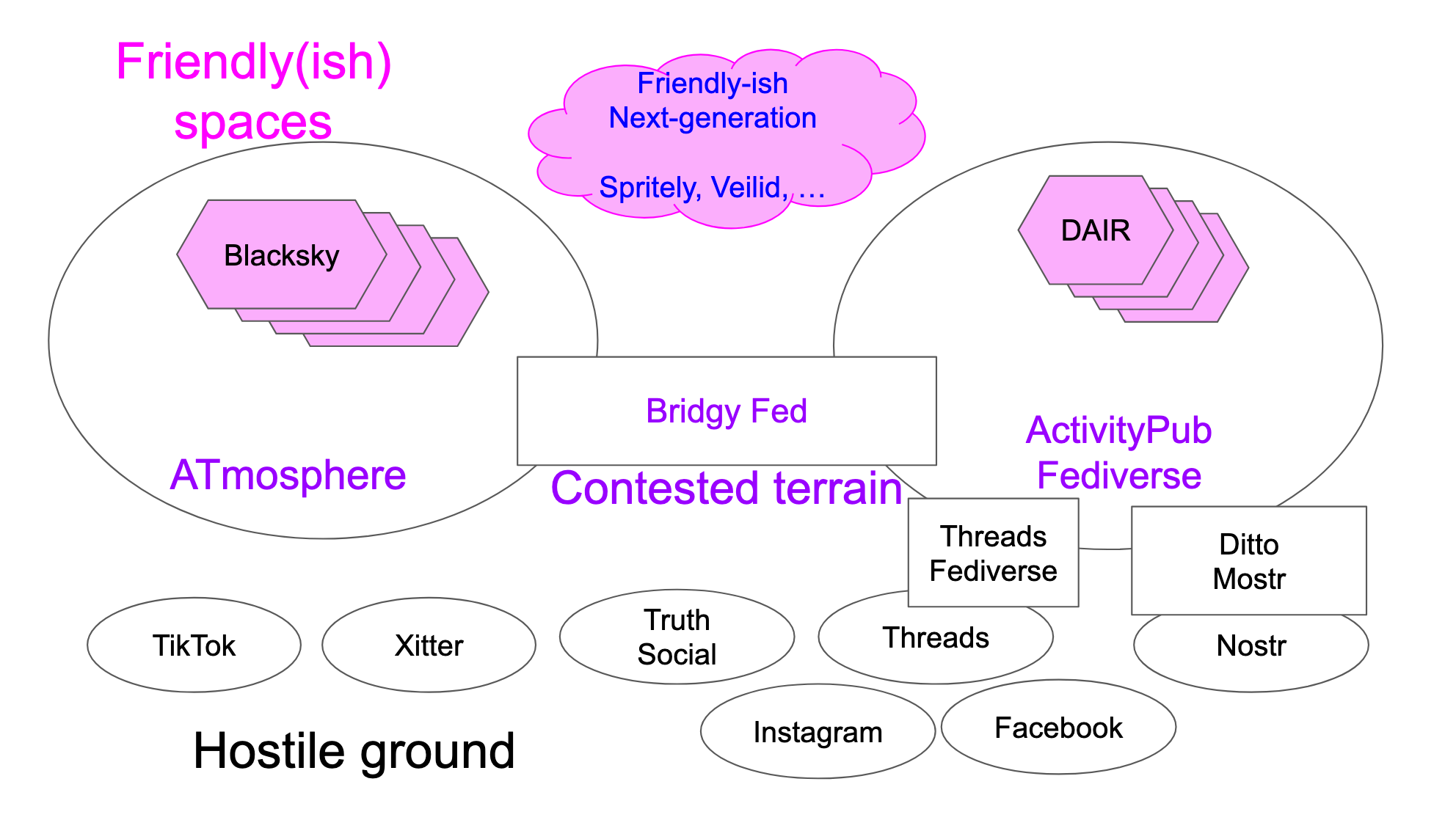
While it wasn't the main focus of this meeting, it's worth looking at this distinction between different areas in a little more detail.
- Friendly(ish) spaces, ideally hosted on platforms we (mostly) control and using software that we can at least influence. Social media examples on distributed social networks include Blacksky, some areas of the "free fediverses" such as DAIR's presence at dair-community.social and DAIR-tube;, and next-generation projects like Spritely and Veilid; self-hosted Matrix, Nextcloud, CryptPad, or Jitsi servers are examples elsewhere in the tech stack We can provide more safety and faster improvement here ... but at least for now the reach is a lot lower. Still, these can be useful in a lot of ways – for example as organizing spaces – and over time we can hopefully draw more people here.
- Contested terrain, where the platforms and software aren't yet fully siding with genocide perpetrators (etc), and communities can have some influence over the software development (for example by leveraging open source and open protocols). The ATmosphere and the ActivityPub Fediverse as a whole are examples of this.6
- Hostile ground: centralized platforms like Xitter, Facebook, Instagram, TikTok, etc), decentralized platforms like Threads, controlled by the currently dominant processes of globalized development, based in surveillance capitalism and data colonialism, supporting fascists, eugencists, white supremacists, perpetrators of genocide, etc. The technology and policies are stacked against us ... but it’s where most people are today, so organizing, mutual aid, and activism needs to happen there as well. As Afsaneh Rigot says in Can We Build Tech That Is Not Oppressive?
"Regardless of abuse from tech companies, people in the US and around the world will continue to use these platforms, especially the most marginalized. The same platforms become people’s lifelines despite the dangers."
In practice, of course, these categories are somewhat fuzzy and there are all kinds of complexities.7
Still, one of the things this model highlights is the importance of connections between different software in a pluriverse. From a social network perspective, this can be via "bridges" like Bridgy Fed, Mostr, and Threads Fediverse; multi-level apps; or low-tech tactics like cut-and-pasting, sharing links, and making text files of accounts to block (or, less positively, to target).
And since some areas of pluriverse are hostile, these connections between neworks and regions are very much a two-edged sword:
- Keeping friendly(ish) spaces and contested terrain safer requires thinking about how bad actors can leverages use bridges and apps to launch attacks and reinforce their other efforts.8 So social threat modeling is vital!
- More positively, though, these connectors can potentially help different friendlyish spaces work together, including providing support to people operating in and contested terrain and hostile ground. As Erin Kissane highlights in People in Platforms: threat modeling is only half the story, and we also really need to be thinking in terms of opportunities too, all as part of a collaborative risk-benefit analysis.
Notes
0 Walter Mignolo's On Pluriversality and Multipolarity in Constructing the Pluriverse: The Geopolitics of Knowledge (2018), has a brief summary of his use of pluriversality as "a key argument for calling into question the concept of universality, so dear to Western cosmology." Arturo Escobar's Designs for the Pluriverse: Radical Interdependence, Autonomy, and the Making of Worlds (2018) maps the principles of autonomous design’s principles to the history of decolonial efforts of indigenous and Afro-descended people in Latin America, and shows how refiguring current design practices "could lead to the creation of more just and sustainable social orders." In Design Justice, A.I., and Escape from the Matrix of Domination (2018), Sasha Costanza-Chock notes that
"Escobar draws from decades of work with social movements led by indigenous and Afro-descended peoples in Latin America and the Caribbean to argue for autonomous design. He traces the ways that most design processes today are oriented towards the reproduction of the ‘One World’ ontology. This means that technology is used to extend capitalist patriarchal modernity, the aims of the market and/or the state, and to erase indigenous ways of being, knowing, and doing (ontologies, epistemologies, practices, and life-worlds). Escobar argues for a decolonized approach to design that focuses on collaborative and place-based practices, and that acknowledges the interdependence of all people, beings, and the earth. He insists on attention to what he calls the ontological dimension of design: all design reproduces certain ways of being, knowing, and doing. He’s interested in the Zapatista concept of creating “a world where many worlds fit,” rather than the ‘one-world’ project of neoliberal globalization."
In A social network taxonomy (2023), Ethan Zuckerman describes a pluriverse as "a complex world of interoperable social networks where one can choose a technical architecture and governance structure appropriate to a community’s needs." I'm dropping the requirement for interoperability, or at least loosening it to include the low-tech approaches Engine Room discusses.
1 Towards a digital pluriverse (2022) from Verses ("a collective of writers, researchers, and technologists co-imagining, practicing, and building a healthier cyberspace") applies this lens to social networks:
"Thus, we hope to learn from both the origins of the pluriverse—its emergence from the Zapatista movement, its use in the anti-neoliberal movements of the 1990s, its expansion into a design practice for collective autonomy—and from the forces that stood and still stand against its realization—the power of both state and capital to push towards individualization and atomization, and the grounded, messy reality of navigating shared social contexts across deep and meaningful divides. These difficulties persist, and we look to the past, the present, and the future to build the capacity necessary for pluriversality."
The Verses page also includes a list of patterns, intended "to seed a pattern language for the pluriverse": interoperability, agency, voice, engagement and attention, privacy, regeneration, commons, and maintenance and care.
Then again, on the About page Verses thanks Gitcoin and Protocol Labs for supporting their work. Protocol Labs is a YCombinator startup, which raised over $200 million in 2017 from invetsors including Marc Andreessen's a16z and has since partnered with a16z crypto on a Crypto Startup School. ... clearly aligned with the Zapatistas' values! Similarly, Dimeji Onafuwa's Power of the Pluriverse (2023) makes some excellent points aimed at helping UX researchers and product makers adopt a pluriversal lens ... but it's on the Microsoft Design blog!
Oh well. Watch capitalist patriarchal modernity work.
For more on Marc Andreessen, see Janus Rose's Major Tech Investor Calls Architect of Fascism a ‘Saint’ in Unhinged Manifesto, Elizabeth Lopatto's The moral bankruptcy of Marc Andreessen and Ben Horowitz, and Anil Dash's writing including Silicon Valley on the Middle Class and Unions (2013). For more on Big Tech's digital colonialism, see the links in A few words about digital colonialism in Should the Fediverse welcome its new surveillance-capitalism overlords? Opinions differ! For Microsoft and genocide, see No Azure For Apartheid and Microsoft blocks emails that contain ‘Palestine’ after employee protests.
2 See Erin Kissane's Against the dark forest for an interesting look at hostile areas of the pluriverse from a different but related perspective
3 Although of course, nothing in software is every as easy as it seems like it could be ... OK, fine, hopefully relatively-easily.
4 And by very quickly I mean 15 seconds sketching out some very high-level ideas, followed by me saying "does this seem okay to get started", pausing for about 5 seconds, and then saying "great let's try it". The planning for this meeting had made it very clear that we were hitting the limits of our current very very very ad hoc commincations structures (and my apologies to anybody who didn't get notifications about the meeting, or who I sent the old link to rather than the updated link), so we need to do something ... we'll see how well it works out, and then iterate.
5 Of course, the specifics of how we approach it are based on who's involved, the technologies and social practices we know about and have experience with, and the constraints we're dealing with, so may not make sense for other groups – and we're making it up as we go along, so some of what we're doing may not even make sense for us. Still, we're approaching creating a friendly(ish) space intentionally, so hopefully others will find this interesting as well, and find ways to adapt some of what to their own organizing challenges ... or at the very least learn from our mistakes.
6 In my opinion, it also makes sense to consider Bluesky contested terrain – they got rid of the odious Jack Dorsey from their board, and their philosophy is libertarian rather than fascist – but your mileage may vary; others consider it hostile ground.
7 For example:
- Individual subreddits, Slacks, and Discord servers can be friendly(ish) even though Reddit as a whole is hostile ground and Slack and Discord are at best contested terrain.
- Nostr's founder's profile has the tag line "leftism is a virus" and it's the odious Jack Dorsey's favorite social network, Farcaster is funded by Marc Andreessen's venture startup, but there are people trying to use the tech for positive ends ... are they contested terrain or hostile ground?
6 For real-world examples of attacks launched form hostile ground into contested terrain and friendly spaces, see
- Conspirador Norteño's Federation and political spam (discussing a 2024 incident where a flock of spam accounts used bridges to push an onslaught of pro-Trump posts from Nostr to Bluesky via Mastodon)
- Anti-Meta Fedi Pact creator Vanta Black's Why? for more on the threat from Meta's Threads Fediverse bridge to "the existing communities of marginalized people on the fediverse, many of whom rely on it to survive."
Should the Fediverse welcome its new surveillance-capitalism overlords? Opinions differ!, Erin Kissane's outstanding Untangling Threads, and Extend, and Exploit: Meta’s plan for ActivityPub, Mastodon and the Fediverse explore the dynamics of Meta's interactions with the ActivityPub Fediverse in more detail; Strategies for the free fediverses and Jamie A. Theophilos's December 2024 Closing the Door to Remain Open: The Politics of Openness and the Practices of Strategic Closure in the Fediverse look at the possibilities of resistance.
Image credit
Original photographer unknown, via picryl and Pixabay, licensed under the Creative Commons CC0 1.0 Universal Public Domain Dedicatio
